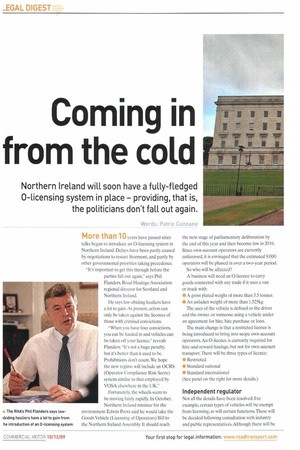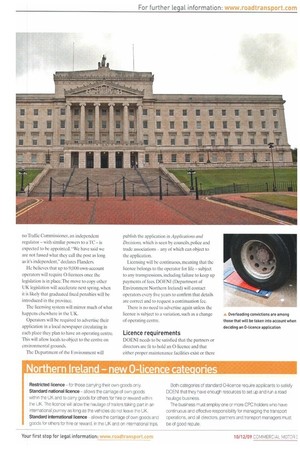Coming in from the cold
Page 30

Page 31

If you've noticed an error in this article please click here to report it so we can fix it.
Northern Ireland will soon have a fully-fledged 0-Licensing system in place providing, that is, the politicians don't fall out again.
Words: Patric unnane
More than 10 years have passed since talks began to introduce an 0-licensing system in Northern Ireland. Delays have been partly caused by negotiations to restart Stormont, and partly by other governmental priorities taking precedence.
"It's important to get this through before the parties fall out again," says Phil Flanders, Road Haulage Association regional director for Scotland and Northern Ireland.
He says law-abiding hauliers have a lot to gain. At present, action can only be taken against the licences of those with criminal convictions.
"When you have four convictions, you can be hauled in and vehicles can be taken off your licence," reveals Flanders. -It's not a huge penalty, but it's better than it used to be. Prohibitions don't count. We hope the new regime will include an OCRS (Operator Compliance Risk Score) system similar to that employed by VOSA elsewhere in the UK."
Fortunately, the wheels seem to be moving fairly rapidly. In October, Northern Ireland minister for the environment Edwin Poots said he would take the Goods Vehicle (Licensing of Operators) Bill to the Northern Ireland Assembly. It should reach the next stage of parliamentary deliberation by the end of this year and then become law in 2010. Since own-account operators are currently unlicensed, it is envisaged that the estimated 9,000 operators will be phased in over a two-year period.
So who will be affected?
A business will need an 0-licence to carry goods connected with any trade if it uses a van or truck with: • A gross plated weight of more than 3.5 tonnes • An unladen weight of more than 1.525kg The user of the vehicle is defined as the driver and the owner, or someone using a vehicle under an agreement for hire, hire purchase or loan.
The main change is that a restricted licence is being introduced to bring into scope own-account operators. An 0-licence is currently required for hire-and-reward haulage, but not for own-account transport. There will be three types of licence: • Restricted • Standard national • Standard international (See panel on the right for more details.) Independent regulator Not all the details have been resolved. For example, certain types of vehicles will be exempt from licensing, as will certain functions. These will be decided following consultation with industry and public representatives. Although there will be no Traffic Commissioner, an independent regulator with similar powers to a TC is expected to be appointed. "We have said we are not fussed what they call the post as long as it's independent," declares Flanders.
He believes that up to 9,000 own-account operators will require 0-licences once the legislation is in place:The move to copy other UK legislation will accelerate next spring, when it is likely that graduated fixed penalties will be introduced in the province.
The licensing system will mirror much of what happens elsewhere in the UK.
Operators will be required to advertise their application in a local newspaper circulating in each place they plan to have an operating centre. This will allow locals to object to the centre on environmental grounds The Department of the Environment will publish the application in Applications and Decisions, which is seen by councils, police and trade associations any of which can object to the application.
Licensing will be continuous, meaning that the licence belongs to the operator for life subject to any transgressions, including failure to keep up payments of fees. DOENI (Department of Environment Northern Ireland) will contact operators every five years to confirm that details are correct and to request a continuation fee.
There is no need to advertise again unless the licence is subject to a variation, such as a change of operating centre.
Licence requirements
DOENI needs to be satisfied that the partners or directors are tit to hold an 0-licence and that either proper maintenance facilities exist or there








































































































































